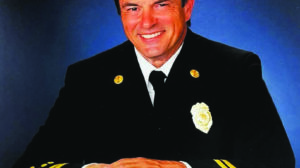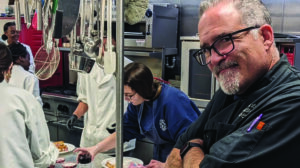Addiction knows no boundaries.”It’s everywhere – from your medicine cabinet to the darkest corners in Colorado Springs,” said Jim Saunders, substance abuse counselor for the El Paso County Department of Health and Environment.Most people have a specific profile of substance abusers, Saunders said. “People think drug addicts are just people who live under the 8th St. Bridge,” he said. “That is not true. There are substance abusers up at the Broadmoor as well as under the 8th St. Bridge.”Matt Disbrow, program director for Valley Hope Outpatient in Colorado Springs, agrees that not only are there misconceptions about what type of people are substance abusers, but also where they reside. “It doesn’t matter where you live,” Disbrow said, adding that it is “more common in bigger cities just because the number of people. There is easy access in Falcon, and I don’t even have to know what’s in Falcon, how big it is or what kind of community. I know that anybody within Falcon has access to that (drugs).”Setting boundaries for addictions may be as difficult as defining it. However, addiction occurs when someone cannot live without a substance or a behavior. In the case of drugs and alcohol, Disbrow said addiction can be a matter of life and death. “To give it up means I’m going to die … that’s what it feels like,” he said. “That’s where the addiction part really takes over, and you can’t even see the possibility of life without it.”When does a habit turn into an addiction?“A lot of times people think that if you use a drug once or twice you are going to be hooked,” Saunders said. “That is not necessarily true. A lot depends on a person’s physiological or psychological make up.” A casual drink now and then does not create an alcoholic, he said. “Abuse or addiction may start as innocently as having a drink or two after a stressful day at work, to take the edge off,” Saunders said. “And if this kind of behavior continues, then a tolerance level is built up and the level increases and a habit or pattern is established.”Disbrow said the line between habit and addiction is somewhat muddled. “When a person crosses the line between just abusing to being dependent, there are a lot of criteria for that,” he said. “And we don’t know when that happens … it’s different for every person.”A person’s biochemistry influences the crossover to addiction, Disbrow said. But, he added, “There is no hard evidence on how quickly a person becomes addicted.”Both agreed that using drugs or alcohol to cope or escape from a problem or a past issue is widespread.”Substances are a way of dealing with that reality and making life more palatable today,” Saunders said. However, “It’s a temporary solution to a long-term problem.”Finding the resourcesDenial is common among substance abusers. “(They are) convincing themselves that they are in control and can stop whenever they want,” Saunders said. “The reason people seek help is because they are tired … their life is so screwed up … they’ve lost so many things and … they want out.”The reason they stop is the same reason they started – it’s about them, he said. “The reason they are quitting is not for anyone else, but for themselves.”Disbrow said recovery is enhanced when the substance abuser admits he or she has a problem as opposed to being forced to make a choice. “It works best if the person using comes to the realization that [their addiction] is a problem,” he said. “A lot of times that doesn’t happen until a family member says it is a problem or their work … you don’t voluntarily give up something that feels good.”Substance abuse is a “family disease,” Disbrow said. “You have the person using and their family has adjusted to that. It becomes a part of everyday life.” He said treatment works better if the focus is on the individual and the family.Saunders and Disbrow said the idea of withdrawal often deters the idea of recovery or they believe their efforts will be futile. “When a person is in recovery, there is a large tendency that a relapse it going to happen again,” Saunders said. Adding to a fear of failure is a low self esteem. However, he said there are no excuses to keep from trying.”No matter how matter times they relapse, as long as they get back on the horse and ride, one of these days they are going to be successful,” he said. “All you have to do is try. It doesn’t happen overnight, but sooner or later you’ll do it.”A few area resources for drug and/or alcohol addiction
- A Accredited Addiction Treatment 24 Hour Hotline1-800-757-0771
- A1 Call Answer 1-800-511-9225
- Addiction Recovery Systems 578-5433
- Alcohol and Drug Treatment Referral 1-800-454-8966
- Alcohol Treatment Center 24-Hour Help Line 1-800-260-4014
- Alcoholics Anonymous 573-5020
- Cedar Springs Behavioral Health System 633-4114
- Drug and Alcohol Counseling and Prevention Programs 578-3150
- El Paso County Health and Environment 578-3150
- Pike Peak Mental Health 572-6330 (Appts./Info.) 635-7000 (24 Hour Crisis Hotline)
- Reigel Center at St. Francis Health Center -776-8741
- Valley Hope Alcohol and Drug Treatment 265-1867






